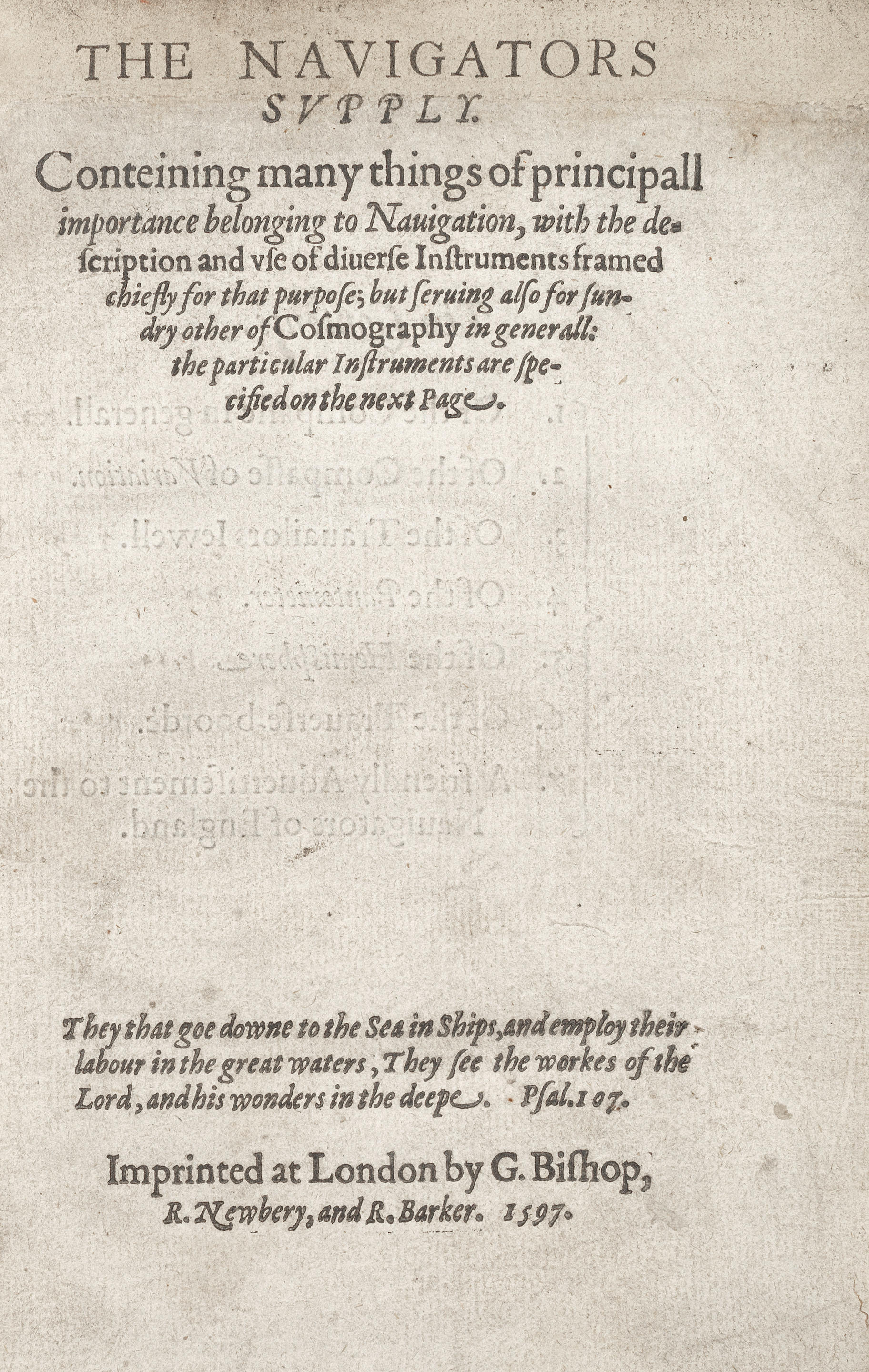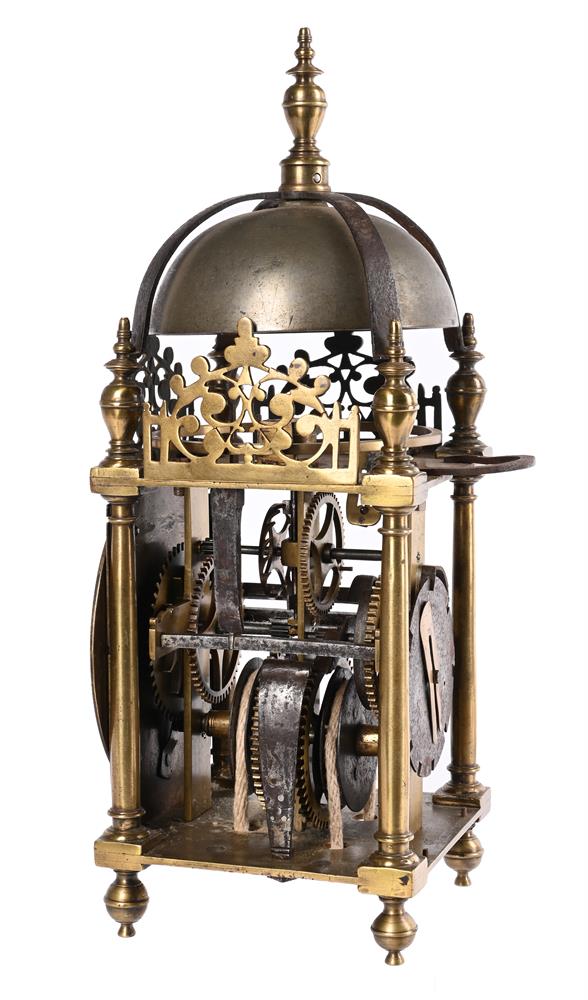Barlow, WilliamMagneticall Advertisements: or Divers Pertinent Observations, and Approved Experiments concerning the Nature and Properties of the Load-stone: Very Pleasant for Knowledge, and most Needfull for Practise, of Travelling, or framing of Instruments fit for Travellers both by Sea and Land. London: Edward Griffin for Timothy Barlow, 1616
4to (182 x 128 mm). Woodcut printer's device on title-page, woodcut diagrams in text (some full-page), woodcut historiated and other decorative initials, typographic headpieces; lacking the terminal errata leaf, title-page and final page soiled, occasional minor marginal dampstaining. Eighteenth-century half calf over marbled boards, red morocco spine label, plain endpapers, gilt edges. Half honey-brown morocco folding-case, red morocco spine label.
First edition of the culmination of Barlow's forty years' research into magnetism, with especial regard to the manufacture and maintenance of the sea-compass, and containing his two fundamental discoveries concerning the directional properties of the compass-needle. Barlow's Magnetical Advertisements was dedicated to Dudley Digges (1583–1639), known for his interest in magnetism, who had for many years urged Barlow to publish on this subject. In this book the English word magnetism is used for the first time. Barlow, a clergyman and son of a bishop, friend and correspondent of William Gilbert, was accused of plagiarism, and this book brought Barlow into conflict with Mark Ridley, formerly physician to the tsar of Russia, who had published his own Magnetical Bodies and Motions in 1613. The two men then engaged in a pamphlet war: Ridley accused Barlow of plagiarizing Magnetical Bodies, Barlow accused Ridley of having surreptitiously gained access to his manuscript when it was in the hands of Sir Thomas Challenor, chamberlain to Prince Henry, to whom Barlow had given the manuscript. "Ridley then claimed that Barlow had simply copied from De magnete, although Barlow had annexed to the text a letter he had received from Gilbert referring to their shared ideas, and praising Barlow's scientific achievements" (ODNB). Uncommon.
REFERENCES:Grolier/Horblit 83; STC 1442; Taylor, Mathematical Practitioners 129; Wheeler Gift 89
PROVENANCE:Library of the Earls of Macclesfield, Shirburn Castle (armorial South Library bookplate with pressmark 183. j. 25; and earlier pressmark written on front pastedown. VI. 9. 61)
Barlow, WilliamMagneticall Advertisements: or Divers Pertinent Observations, and Approved Experiments concerning the Nature and Properties of the Load-stone: Very Pleasant for Knowledge, and most Needfull for Practise, of Travelling, or framing of Instruments fit for Travellers both by Sea and Land. London: Edward Griffin for Timothy Barlow, 1616
4to (182 x 128 mm). Woodcut printer's device on title-page, woodcut diagrams in text (some full-page), woodcut historiated and other decorative initials, typographic headpieces; lacking the terminal errata leaf, title-page and final page soiled, occasional minor marginal dampstaining. Eighteenth-century half calf over marbled boards, red morocco spine label, plain endpapers, gilt edges. Half honey-brown morocco folding-case, red morocco spine label.
First edition of the culmination of Barlow's forty years' research into magnetism, with especial regard to the manufacture and maintenance of the sea-compass, and containing his two fundamental discoveries concerning the directional properties of the compass-needle. Barlow's Magnetical Advertisements was dedicated to Dudley Digges (1583–1639), known for his interest in magnetism, who had for many years urged Barlow to publish on this subject. In this book the English word magnetism is used for the first time. Barlow, a clergyman and son of a bishop, friend and correspondent of William Gilbert, was accused of plagiarism, and this book brought Barlow into conflict with Mark Ridley, formerly physician to the tsar of Russia, who had published his own Magnetical Bodies and Motions in 1613. The two men then engaged in a pamphlet war: Ridley accused Barlow of plagiarizing Magnetical Bodies, Barlow accused Ridley of having surreptitiously gained access to his manuscript when it was in the hands of Sir Thomas Challenor, chamberlain to Prince Henry, to whom Barlow had given the manuscript. "Ridley then claimed that Barlow had simply copied from De magnete, although Barlow had annexed to the text a letter he had received from Gilbert referring to their shared ideas, and praising Barlow's scientific achievements" (ODNB). Uncommon.
REFERENCES:Grolier/Horblit 83; STC 1442; Taylor, Mathematical Practitioners 129; Wheeler Gift 89
PROVENANCE:Library of the Earls of Macclesfield, Shirburn Castle (armorial South Library bookplate with pressmark 183. j. 25; and earlier pressmark written on front pastedown. VI. 9. 61)

.jpg)











.jpg)

Testen Sie LotSearch und seine Premium-Features 7 Tage - ohne Kosten!
Lassen Sie sich automatisch über neue Objekte in kommenden Auktionen benachrichtigen.
Suchauftrag anlegen